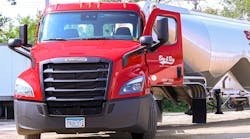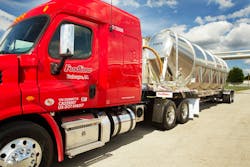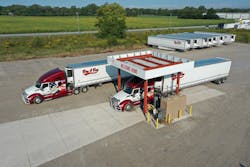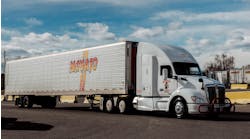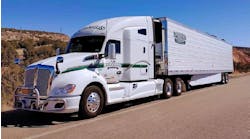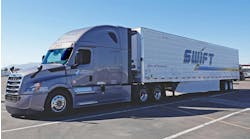Bay & Bay sells dry bulk business to Foodliner
Bay & Bay Transportation’s transformation from tank to refrigerated fleet is complete.
The Minnesota-based carrier that primarily hauled dry bulk when CEO Sam Anderson’s parents purchased the company in 1988 sold its remaining tank-truck business to McCoy Group’s Foodliner this month. The deal, finalized Oct. 1, included 38 trucks and about 90 pneumatic and hopper-bottom trailers.
Terms of the transaction were not disclosed.
“We have so many dedicated employees and customers in that tank segment, and I wanted to make sure the employees would continue to have growth opportunities, and the customers would continue to be taken care of in a way that would be as good or better than what we could do,” Anderson told Refrigerated Transporter, FleetOwner's sister publication.
Strategic expansion
The acquisition is the Dubuque, Iowa-headquartered McCoy Group’s first since absorbing W.W. Transport, based in Burlington, Iowa, in a deal announced in January 2021. Tim Stueck, chief financial officer for the McCoy transportation group, said Bay & Bay’s specialized services division appealed to them because it grows McCoy’s non-food grade dry bulk business, and provides strategic expansion in the Midwest.
See also: McCoy Group adds W.W. Transport
The Burnsville, Minnesota-based division primarily hauls cement, sand, salt, fly ash, and roofing materials. “Our intention is to continue operating it as is, and hopefully grow it,” Stueck told Refrigerated Transporter, adding they already assumed the lease for the Burnsville facility, and offered positions to the operation’s employees.
The 90 trailers primarily are Mac LTTs and Polar Tank trailers, and the trucks, conveniently, are Freightliners. The McCoy Group also owns Truck Country, which is a Freightliner dealer. “That’s not always a material reason for us to do an acquisition, but it’s nice when the equipment is the same as we’re used to,” Stueck said.
McCoy’s transportation group, which includes Questliner, boasts 1,500 tractors and 3,100 trailers.
Refined focus
Anderson said divesting Bay & Bay’s dry bulk business allows it to further refine its focus on refrigerated transportation and multimodal logistics. As part of the deal, Bay & Bay moved its dedicated trucking teams to Eagan, Minnesota.
“We are very committed to the refrigerated trucking and logistics segments of the market, and this helps further our investment and commitment to those customers, and to our team and the folks who are focused on those areas,” he said. “Technology is becoming a bigger thing in our industry, and a more important thing, that you have to invest in to really drive the business strategy. So we want to be able to continue to invest in those things that are going to help us serve our customers and bring value to them.”
Proceeds from the sale will be used “to invest in people, technology, equipment and facilities,” Anderson added.
Bay & Bay still had tank trucks, and five disparate dry van divisions up until 2014, when Anderson began transforming the carrier into a reefer-focused operation because its refrigerated division, formed in 2007 after the acquisition of D&T Trucking, fared best during the 2008 recession. The company now has more than 500 reefer drivers after realizing a compounded annual growth rate of more than 30% each of the last four years, Anderson said. He reported trucking revenues of about $220 million for 2021, and said total company revenues will exceed $375 million this year.
“Foodliner and the McCoy family share similar values and ideals to Bay & Bay,” Anderson said in a release. “We appreciate and respect all of our team members that are part of this change, and believe Foodliner and the McCoy family can provide our Bay & Bay tank-trucking team with great opportunities in the future.”
Multimodal logistics
Bay & Bay also recently acquired a facility in northern Indiana, the company said.
It’s multimodal logistics business offers LTL, full truckload, and intermodal services; and is a true intermodal marketing company (IMC) with direct contracts with more than 60 regional and national LTL companies, and six major railroads.
“The company’s decision to invest in Indiana strengthens our presence in the Midwest for new and existing customers,” Mike Westland, Bay & Bay's CFO, said in a release. “It also provides our hard-working drivers with additional opportunities throughout the country.”
This article originally appeared in Bulk Transporter.
